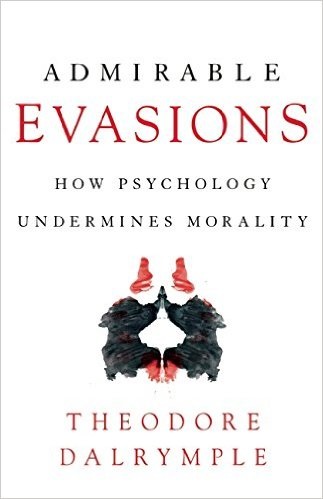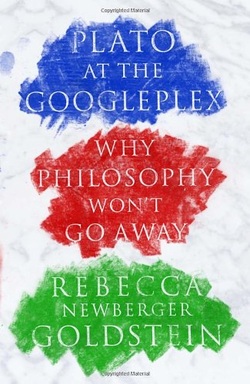 Admirable Evasions: How Psychology Undermines Morality
Admirable Evasions: How Psychology Undermines Morality by Theodore Dalrymple, Encounter Books, 2015. Available through
Amazon,
Barnes & Noble, and through
Encounter Books. There is also a blog dedicated to Dalrymple’s work (although not authored by him) called
The Skeptical Doctor. Well worth dipping into if you find the following review interesting.
It’s a little ironic, isn’t it, that I write this blog about being happy, which fits well within the “positive psychology” subject area, and yet I’m pushing you to read a book that says psychology is a bunch of baloney? But there’s no real conflict of ideas here between Dalrymple and me. He’s not saying that psychology per se, that is, studying how people think, how the brain works, etc., is the problem. It’s the conclusions that are extracted from these studies by modern psychologists and psychiatrists that he attacks with such verve and nerve. Really, I beg you to get this book and read it carefully. It’s only 119 pages, so it won’t take you very long, and you’ll get great insights on every page.
 Admirable Evasions: How Psychology Undermines Morality by Theodore Dalrymple, Encounter Books, 2015. Available through Amazon, Barnes & Noble, and through Encounter Books. There is also a blog dedicated to Dalrymple’s work (although not authored by him) called The Skeptical Doctor. Well worth dipping into if you find the following review interesting.
Admirable Evasions: How Psychology Undermines Morality by Theodore Dalrymple, Encounter Books, 2015. Available through Amazon, Barnes & Noble, and through Encounter Books. There is also a blog dedicated to Dalrymple’s work (although not authored by him) called The Skeptical Doctor. Well worth dipping into if you find the following review interesting.
 Admirable Evasions: How Psychology Undermines Morality by Theodore Dalrymple, Encounter Books, 2015. Available through Amazon, Barnes & Noble, and through Encounter Books. There is also a blog dedicated to Dalrymple’s work (although not authored by him) called The Skeptical Doctor. Well worth dipping into if you find the following review interesting.
Admirable Evasions: How Psychology Undermines Morality by Theodore Dalrymple, Encounter Books, 2015. Available through Amazon, Barnes & Noble, and through Encounter Books. There is also a blog dedicated to Dalrymple’s work (although not authored by him) called The Skeptical Doctor. Well worth dipping into if you find the following review interesting.
 Scribbled on one of the many scraps of paper I accumulate is something from a recent church care group meeting in our home. We get together a couple of times a month to discuss ideas sparked by recent sermons. One of our members mentioned that we humans have the tendency in our thinking to be vague about the problem but specific about the solution, and he gave as an example the above phrase, something he’d gotten from a friend at work.
Scribbled on one of the many scraps of paper I accumulate is something from a recent church care group meeting in our home. We get together a couple of times a month to discuss ideas sparked by recent sermons. One of our members mentioned that we humans have the tendency in our thinking to be vague about the problem but specific about the solution, and he gave as an example the above phrase, something he’d gotten from a friend at work.